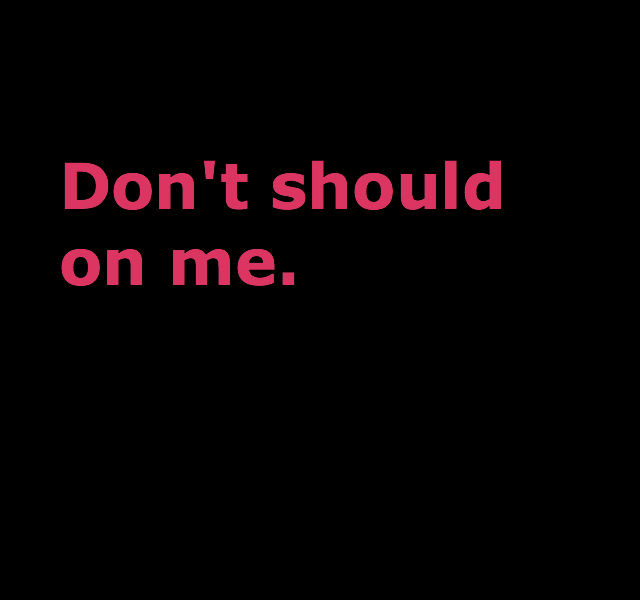Mussar without "Should"s and "Shouldn't"s

Mussar without "Should"s and "Shouldn't"s
"Don't should on me" is an aphorism which my Mishlei rebbi is fond of saying in response to people using the word "should." This saying is consistent with his general approach to Mishlei, to mussar, and to life.
Unlike many approaches to mussar, which involve many "should"s and "shouldn't"s, there is only one "should" in my Mishlei rebbi's derech: "you should learn." His derech is built upon a simple but powerful premise: chochmah changes people. And not just any chochmah, but the type of chochmah that Chazal were referring to when they said, "Who is a chacham? One who sees the consequences of his actions" (Tamid 32b). The type of chochmah which is the subject of the book of Mishlei.
My rebbi's theory is that if you gain knowledge of consequences, and you keep reviewing that knowledge from as many angles as you can until it is crystal clear, that knowledge will eventually start to become real to you. And once it is real to the point where you not only "know" the consequences, but really "see" them, then that knowledge will begin to change your emotions, your behavior, and your decision-making. All you need to do is keep learning and keep reviewing. Over time, your chochmah will become real to you, and will transform you into a different person.
In this derech, there is no need for "should"s and "shouldn't"s. To the contrary, "should"s and "shouldn't"s can be harmful, since they threaten to supplant chochmah with "authority" (i.e. "superego" or "conscience") as the motivating factor in one's behavior.
My Mishlei rebbi always reminds us that he has a terrible memory when it comes to sources. Oftentimes, when we ask him about the source of an idea that he quoted, he'll just say, "I got it from learning Mishlei. I can't be more specific than that." I must admit that when I first started learning with him, these attributions to Mishlei didn't sit well with me. I couldn't help but wonder: "Is this really what Mishlei teaches, or is this just my rebbi's idea which he sees in Mishlei, but which I might not?" But the more I learned with him, the more I gradually came to realize how many of his ideas were explicitly stated right there in Mishlei and in its meforshim.
My rebbi's approach to mussar which I described above made sense to me from an early age. The more I learned Mishlei, the more convinced I became that my rebbi was correct, and that this derech of mussar was, indeed, the derech of Shlomo ha'Melech himself. Still, it bothered me that I never saw this approach explicitly spelled out in Mishlei or its meforshim.
That changed today. I had been learning Chapter 13 of Mishlei with my Mishlei rebbi, and we stumbled upon a little paragraph in the Meiri's commentary to Mishlei 13:5. The Meiri writes:
We have already explained above (Mishlei 6:12) that teaching someone that something bad is bad is half of the rebuke. Likewise, teaching someone that something good is good is half of the motivation [to improve oneself]. Therefore, the majority of Shlomo ha'Melech's statements do not contain any direct commands; rather, [his statements convey] knowledge about something good that it is good, in order to motivate a person to do it, and knowledge about something bad that it is bad, to motivate a person to refrain from it.
The Meiri referred us to an earlier place in his commentary, where he states this principle in different terms and explains how it works:
The wise man said, "Knowledge that a thing is bad is half of teshuvah, and teaching someone that a thing is bad is half of a rebuke." In other words, once a person knows that something is bad, it will be easier for him to subdue his emotions and to do teshuvah from it. That being said, once the chacham informs someone that it is bad, and is the action of scoundrels, that is like a rebuke and a warning not to do it.
The Meiri stated exactly what my Mishlei rebbi has been saying for all of these years. Shlomo ha'Melech's approach to mussar doesn't involve telling us "you should do such-and-such" or "you shouldn't do such-and-such." Rather, Shlomo ha'Melech merely teaches us the benefits and consequences of good and bad decisions, and that knowledge itself changes our emotions and decisions, without any need for explicit commands.
It is important to note that Shlomo ha'Melech could have easily conveyed this knowledge and ALSO formulated his teachings as "should"s and "shouldn't"s -- but he didn't. Why not? Perhaps because of what I wrote earlier, that "should"s and "shouldn't"s are fueled by the superego, making it harder for the chochmah itself to influence our behavior. Or perhaps because he didn't want us to fall into the trap of labeling certain actions as inherently good or inherently bad. Or maybe it was because he didn't want to limit our application of his lessons to the particular case.
Whatever the reason, the fact remains that Mishlei - despite its identity as a book of mussar - contains very few "should"s and "shouldn't"s. In my opinion, the Meiri and my Mishlei rebbi give a very compelling explanation for why this is the case. Should you accept this answer? That is something for you to decide yourself.



